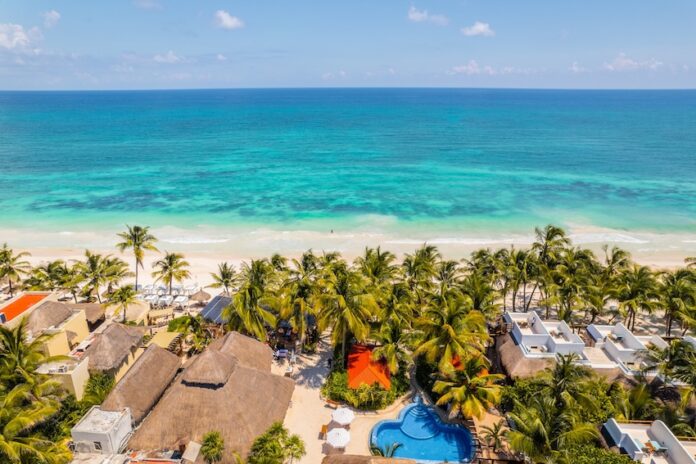Fifteen hotels and beach clubs in Tulum, Quintana Roo, have agreed to provide free beach access with no cover charge or minimum consumption requirement, according to Municipal President Diego Castañón Trejo.
“We are very pleased to announce that this weekend, we were able to add 15 more beach access points, thanks to the willingness of hotel owners and beach clubs in the area, who have agreed to allow people access through their facilities,” he said.
The list includes some of the most iconic beach clubs and boutique hotels in Tulum:
- Papaya Playa Project
- La Eufemia
- Casa Violeta
- Ahau
- Selina Tulum
- Vagalume
- Kanan
- Dune Boutique Hotel
- Ikal
- Shambala Petit Hotel
- Cabañas La Luna
- Panamera
- Aldea Tulum
- Akiin Beach Club
- Coco Tulum
Castañón said these efforts are part of a broader strategy to boost tourism and make it easier for both locals and tourists to enjoy Tulum’s beaches at no additional cost.
This agreement represents a rare show of solidarity from the private sector and local government, following complaints surrounding tourism costs. The move comes after hundreds of Tulum residents protested for free beach access, following the imposition of an entrance fee for previously free beaches at the newly opened Jaguar National Park.
“The beaches are life, they are history, they are the heritage of our grandparents and the future of our children,” protesters in Tulum were recently reported saying. “No government or business will be able to take them away or privatize them.”
The Jaguar Park, adjacent to the Tulum ruins, is a protected natural and cultural reserve that spans a large area of jungle and coastline. Following the protests, the southern access to the Jaguar Park beaches will remain open year-round at no cost.
Free access to beaches is a constitutional right under Mexican law
Although the Mexican Constitution recognizes beaches as national assets for common use, there are no clear and effective laws guaranteeing free and open access for all. Thus, this constitutional right is often violated with instances of blocked access, unjustified charges and occupation by tourist developments that restrict collective use of the coastline.
In some tourist destinations, such as Tulum, this problem has become particularly evident – beaches that were once open to everyone now have fees and physical barriers that restrict their use.
Earlier this month, Quintana Roo Governor Mara Lezama led a meeting with Adolfo Héctor Tonatiuh Velasco Bernal, general director of Grupo Mundo Maya (the management company in charge of Jaguar Park), to strengthen coordination between institutions at all three levels of government and ensure free access to the beaches of Tulum.
A statement following the meeting said that these actions reaffirm the government’s commitment “to working in a coordinated manner to ensure that Quintana Roo’s natural spaces are accessible to all, strengthening the region’s social and tourism development.”
With reports from La Crónica de Hoy, La Jornada Maya and Sol Yucatán
